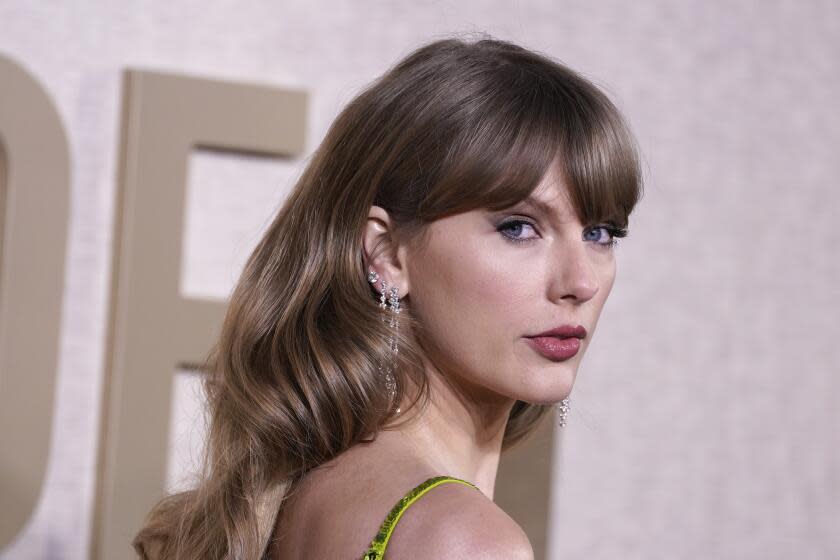Beware Taylor Swift, the AI edition: The singer is not giving away free Le Creuset cookware

- Oops!Something went wrong.Please try again later.
AI-generated fake advertisements are making the rounds on social media again, this time using the voice and likeness of Taylor Swift promising free Le Creuset cookware sets.
As any proper Swiftie knows, the "Hoax" singer is fan of Le Creuset. In the pop star's 2020 documentary "Miss Americana," she whipped up some pasta sauce in the brand's blue dutch oven. And back in 2014, Swift surprised “superfan” Gena Gabrielle by attending her bridal shower with several gifts in tow, including two items from the luxury cookware line.
Scammers used artificial intelligence technology to craft a synthetic version of the singer’s voice, the New York Times reported Tuesday. The audio was played over various images of Le Creuset products and clips of Swift, some lifted from her 2016 interview with Vogue, "73 Questions with Taylor Swift," in which the Grammy winner gives the outlet a tour of her home while answering rapid-fire questions.
Read more: Taylor Swift fan 'in awe' that star surprised her at bridal shower
In multiple social media ads, Swift's voice is manipulated to sound as though she's “thrilled” to be giving away to her "loyal fans" free cookware sets that are available due to a "packaging error." Fans need only to offer up their personal information and pay a $9.96 shipping fee.
A spokesperson for Le Creuset told The Times in a statement that the brand is not not involved with Taylor Swift for any consumer giveaway. "All approved Le Creuset giveaways or promotions come from the official Le Creuset social accounts," the statement said. "Consumers should always check Le Creuset’s official social accounts and website before clicking on any suspicious ads."
Representative for Swift did not immediately respond to The Times' request for comment.
Read more: Letters to the Editor: Ban AI-generated 'deepfakes.' The risk to society is extreme
Recent advances in artificial intelligence have made it easier to create deepfakes and convincing celebrity audio clips. “These tools are becoming very accessible these days,” Siwei Lyu, a computer science professor who runs the Media Forensic Lab at the University at Buffalo, told the New York Times. Lyu added it could take less than 45 minutes to make a “decent-quality video.”
Lyu continued that the fake Le Creuset giveaway was likely created using a text-to-speech service, which can translate a script into an A.I.-generated voice, and then paired with a video using a lip-syncing software.
Last June, "Yellowstone" star and country musician Lainey Wilson saw her voice and likeness used by scammers to peddle weight-loss gummies. The "Heart Like a Truck" hitmaker shared a video on Instagram slamming the fake ads.
Read more: How Lainey Wilson, an '11-year overnight sensation,' became country music's brightest new star
"By now I'm sure a lot of y'all have seen some ads about me losing weight, being hospitalized, and then I started taking some weight loss gummies and blah blah blah, they saved my life well surprise — it ain't true," she said.
"People will do whatever to make a dollar, even if it's lies because ain't nobody sent me any gummies ... I love y'all. I just don't want y'all spending your money on something that ain't real, do not fall for it."
And in September, Oscar-winning actor Tom Hanks appeared in deepfake dental advertisements. The "Asteroid City" star quickly shot them down via his Instagram, sharing a still from the scam video with the caption, "Beware! There's a video out there promoting some dental plan with an AI version of me. I have nothing to do with it."
Read more: Tom Hanks disavows AI clone amid Hollywood's robot reckoning
Last year, when a sharp uptick in fake celebrity ads began plaguing the internet, USA Today shared a guide for spotting AI-generated videos that explained red flags to look out for, including perfect symmetry, distortion, unusual proportions and unnatural textures. There are also AI-detection tools that can be accessed online, including AI or Not and Maybe's AI Art Detector.
This story originally appeared in Los Angeles Times.

